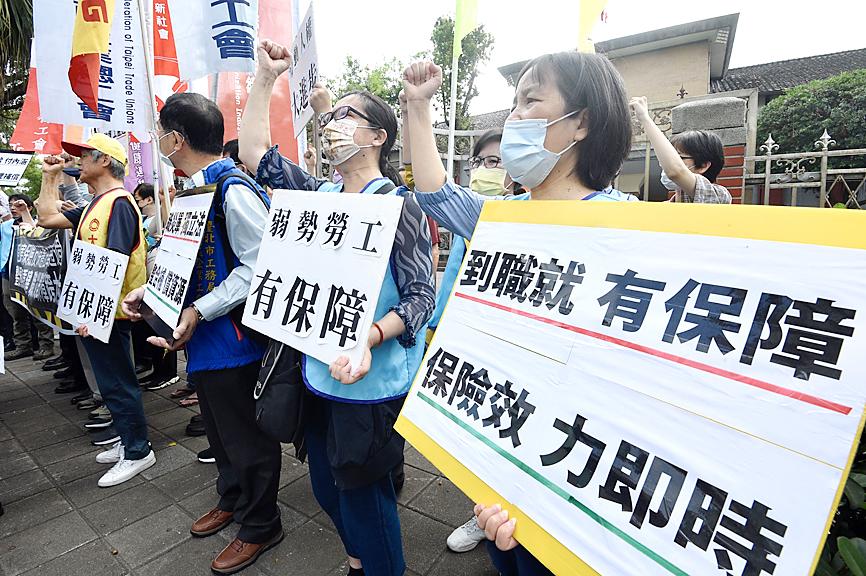More than 10 million people are to be affected after disability premiums and mandatory insurance rules were overhauled yesterday, as the Legislative Yuan passed the Labor Occupational Hazard Insurance and Protection Act (勞工職業災害保險及保護法).
Individuals are to receive payments matching their salary for the first and second month, and 70 percent each subsequent month, up from 70 percent in the first year and 50 percent in the second year in the Labor Standards Act (勞動基準法), the new regulations say.
Payouts are capped at two years, they say.

Photo: George Tsorng, Taipei Times
The Permanent Disability Pension, which was previously calculated based on time spent at a company, is to be calculated based on the degree or level of disability.
A completely disabled person would receive payments equal to 70 percent of their salary, severe disabilities would qualify for 50 percent payments and partially disabled people would receive 20 percent, the new act says.
Families of people killed on the job would be entitled to 50 percent of the salary per month, it says.
All employees of registered companies have to be insured, instead of employees at companies with a headcount of at least five, it says.
The minimum premium for workers is tied to the minimum wage, while the maximum is NT$72,800, which is more than what 90 percent of workers earn, it says.
Anticipating the act’s passage, legislators and labor rights groups earlier yesterday held a news conference in front of the Legislative Yuan in Taipei.
Taiwan Occupation Safety and Health president Liao Hui-fang (廖蕙芳) said that the act, once promulgated, would be the first law providing a legal basis for occupational hazards disputes.
It is a milestone for Taiwanese labor safety, Liao said.
The labor sector has been asking for such legislation for more than a decade, and the efforts of lawmakers to push it through before Labor Day on Saturday next week is the best gift they could offer to workers, she said.
Labor rights organizations would keep a close watch on the government as the regulations are implemented, she said.
Kaohsiung City Confederation of Trade Unions deputy director Chiang Chien-hsing (江健興) said that the act would not only protect workers, but also reduce risks for employers.
New Power Party Legislator Claire Wang (王婉諭) said she was happy that the legislation included migrant workers under the mandatory insurance policies.
Chinese Nationalist Party (KMT) Legislator Chiang Wan-an (蔣萬安) said he hoped that the law, once promulgated, would truly help workers by preventing occupational hazards and upholding a reasonable payout scheme.

POSITIVE DEVELOPMENT: Japan and the US are expected to hold in-depth discussions on Taiwan-related issues during the meeting next month, Japanese sources said The holding of a Japan-US leaders’ meeting ahead of US President Donald Trump’s visit to China is positive news for Taiwan, former Japan-Taiwan Exchange Association representative Hiroyasu Izumi said yesterday. After the Liberal Democratic Party’s landslide victory in Japan’s House of Representatives election, Japanese Prime Minister Sanae Takaichi is scheduled to visit the US next month, where she is to meet with Trump ahead of the US president’s planned visit to China from March 31 to April 2 for a meeting with Chinese President Xi Jinping (習近平). Japan and the US are expected to hold in-depth discussions on Taiwan-related issues during the

‘LIKE-MINDED PARTNER’: Tako van Popta said it would be inappropriate to delay signing the deal with Taiwan because of China, adding he would promote the issue Canadian senators have stressed Taiwan’s importance for international trade and expressed enthusiasm for ensuring the Taiwan-Canada trade cooperation framework agreement is implemented this year. Representative to Canada Harry Tseng (曾厚仁) in an interview with the Central News Agency (CNA) said he was increasingly uneasy about Ottawa’s delays in signing the agreement, especially as Ottawa has warmed toward Beijing. There are “no negotiations left. Not only [is it] initialed, we have three versions of the text ready: English, French and Mandarin,” Tseng said. “That tells you how close we are to the final signature.” Tseng said that he hoped Canadian Prime Minister Mark Carney

President William Lai (賴清德) yesterday bestowed one of Taiwan’s highest honors on Saint Vincent and the Grenadines (SVG) Ambassador Andrea Clare Bowman in recognition of her contributions to bilateral ties. “By conferring the Order of Brilliant Star with Grand Cordon on Ambassador Bowman today, I want to sincerely thank her, on behalf of the Taiwanese people, for her outstanding contribution to deepening diplomatic ties between Taiwan and SVG,” Lai said at a ceremony held at the Presidential Office in Taipei. He noted that Bowman became SVG’s first ambassador to Taiwan in 2019 and

A man walks past elementary school artworks at the Taipei Lantern Festival in Ximen District yesterday, the first day of the event. The festival is to run from 5pm to 10pm through March 15.